

Jerzy Grotowski. Jerzy Grotowski (/'jɛr.zi groʊ'tɑv.ski/; 11 August 1933 – 14 January 1999) was a Polish theatre director and innovator of experimental theatre, the "theatre laboratory" and "poor theatre" concepts.
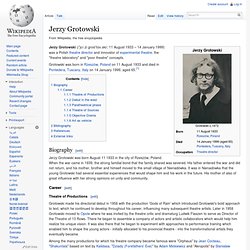
Grotowski was born in Rzeszów, Poland on 11 August 1933 and died in Pontedera, Tuscany, Italy on 14 January 1999, aged 65.[1] Biography[edit] Jerzy Grotowski was born August 11 1933 in the city of Rzeszów, Poland. When the war came in 1939, the strong familial bond that the family shared was severed. His father entered the war and did not return, and his mother, brother and himself moved to the small village of Nienadówka. Career[edit] Theatre of Productions[edit] Grotowski made his directorial debut in 1958 with the production 'Gods of Rain' which introduced Grotowski's bold approach to text, which he continued to develop throughout his career, influencing many subsequent theatre artists. The last professional production from Grotowski as a director was in 1969. Peter Brook. Peter Stephen Paul Brook CH, CBE (born 21 March 1925) is an English theatre and film director and innovator, who has been based in France since the early 1970s.
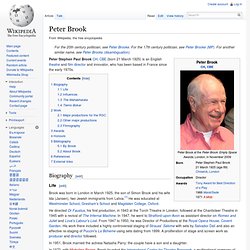
Adolphe Appia. Adolphe Appia ca. 1900 Adolphe Appia (born 1 September 1862 in Geneva; died 29 February 1928 in Nyon), son of Red Cross co-founder Louis Appia, was a Swiss architect and theorist of stage lighting and décor.
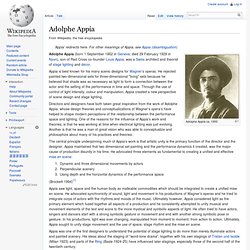
Appia is best known for his many scenic designs for Wagner’s operas. He rejected painted two-dimensional sets for three-dimensional "living" sets because he believed that shade was as necessary as light to form a connection between the actor and the setting of the performance in time and space. Through the use of control of light intensity, colour and manipulation, Appia created a new perspective of scene design and stage lighting.
Directors and designers have both taken great inspiration from the work of Adolphe Appia, whose design theories and conceptualizations of Wagner’s opera’s have helped to shape modern perceptions of the relationship between the performance space and lighting. Bertolt Brecht. Bertolt Brecht (English: /brɛkt/[1][2][3] German: [ˈbɛɐ̯tɔlt ˈbʁɛçt] ( ); born Eugen Berthold Friedrich Brecht ; 10 February 1898 – 14 August 1956) was a German poet, playwright, theatre director, and Marxist.
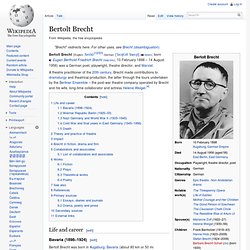
A theatre practitioner of the 20th century, Brecht made contributions to dramaturgy and theatrical production, the latter through the tours undertaken by the Berliner Ensemble – the post-war theatre company operated by Brecht and his wife, long-time collaborator and actress Helene Weigel.[4] Life and career[edit] Bavaria (1898–1924)[edit] Bertolt Brecht was born in Augsburg, Bavaria (about 80 km or 50 mi north-west of Munich), to a devout Protestant mother and a Catholic father (who had been persuaded to have a Protestant wedding). When he was 16, the First World War broke out. In July 1919, Brecht and Paula Banholzer (de) (who had begun a relationship in 1917) had a son, Frank. "[Brecht's] language is vivid without being deliberately poetic, symbolical without being over literary.
Edward Gordon Craig. Edward Henry Gordon Craig (16 January 1872 – 29 July 1966), sometimes known as Gordon Craig, was an English modernist theatre practitioner; he worked as an actor, director and scenic designer, as well as developing an influential body of theoretical writings.
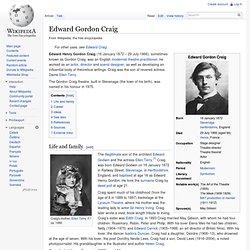
Craig was the son of revered actress Dame Ellen Terry. The Gordon Craig theatre, built in Stevenage (the town of his birth), was named in his honour in 1975. Life and family[edit] The illegitimate son of the architect Edward Godwin and the actress Ellen Terry.[1] Craig was born Edward Godwin on 16 January 1872 in Railway Street, Stevenage, in Hertfordshire, England, and baptised at age 16 as Edward Henry Gordon. He took the surname Craig by deed poll at age 21. Craig spent much of his childhood (from the age of 8 in 1889 to 1897) backstage at the Lyceum Theatre, where his mother was the leading lady to actor Sir Henry Irving. Antonin Artaud. Antoine Marie Joseph Artaud, better known as Antonin Artaud (French: [aʁto]; 4 September 1896 – 4 March 1948), was a French playwright, poet, actor, essayist, and theatre director.[1] §Early life[edit] Antoine Artaud was born 4 September 1896 in Marseille, France, to Euphrasie Nalpas and Antoine-Roi Artaud.[2] Both his parents were natives of Smyrna (modern-day İzmir), and he was greatly affected by his Greek ancestry.[2] His mother gave birth to nine children, but only Antonin and one sister survived infancy.

When he was four years old, Artaud had a severe case of meningitis, which gave him a nervous, irritable temperament throughout his adolescence. He also suffered from neuralgia, stammering, and severe bouts of clinical depression. [citation needed] Artaud's parents arranged a long series of sanatorium stays for their temperamental son, which were both prolonged and expensive. §Paris[edit] In 1926-28, Artaud ran the Alfred Jarry Theatre, along with Roger Vitrac. Constantin Stanislavski.